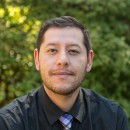Page 80 • (3,807 results in 0.056 seconds)
-

Mathematics major Lindsey Clark ’24 is a Noyce scholar and future teacher Posted by: nicolacs / April 2, 2024 April 2, 2024 By Mark StorerPLU Marketing & Communications Guest Writer Lindsey Clark ’24 came to PLU knowing it was where she wanted to be. But Clark—a double major in mathematics and gender, sexuality, and race studies (GSRS)—says PLU challenged and changed her and expanded her worldview in ways she never before considered on her way to becoming a math teacher. “Math is kind of what I
-

Anthropology Business Economics Political Science Psychology Social Work Sociology Books Wikipedia and Academic Libraries: A Global Project (Maize Books 2021) : View Book The Grounded Instruction Librarian: Participating in the Scholarship of Teaching and Learning. Chapters Chapters Visions of the Possible: A Critical Pedagogical Praxis for Information Literacy Instruction. (ACRL 2019) Improving Library Services in Support of International Students and English as a Second Language (ESL) Learners. Chapters
Area of Emphasis/Expertise -
Examination of issues of race, class, gender, sexual orientation, etc. as they relate to educational practices. (4) EDUC 287 : Special Topics in Education To provide undergraduate students with new, one-time, and developing courses not yet available in the regular curriculum. The title will be listed on the student term-based record as ST: followed by the specific title designated by the academic unit. (1 to 4) EDUC 288 : Special Topics in Education To provide undergraduate students with new, one-time
-

, protect the planet and transform local communities. The symposium represents a collaboration with Gender, Sexuality, and Race Studies, the Diversity Center, Innovation Studies, the Department of Social Work, and the Dale E. Benson Lecture in Business and Economic History. From the start, each Wang Symposium has been conceived as interdisciplinary and global in reach. Each is designed to serve the entire PLU community as it addresses issues of concern. “The underlying assumption, of course, is that the
-
business, you will likely be able to find interesting and challenging entry-level positions that seek people with strong quantitative skills. Your studies here can also prepare you for different graduate-level work including masters programs in mathematics, data science, and bioinformatics, that will prepare you for more advanced careers with major businesses or at national laboratories. Our graduates have paired their study of mathematics with majors such as Hispanic studies, English, or music and
-

perspective rings true to business and sociology double major Allisa Ouanesisouk ‘21. “My classes have the perfect balance of learning about how businesses are run and how to make the most ethical decision-making,” she says. “With my core business classes, I am able to learn how the systems are implemented in order to make a successful business. In other classes, I am able to have discussions on how to come up with the best decision method or how to be a supportive leader or manager.” A critical
-
Publishing, Surrey, UK. ISBN: 978-1409435167. 2014) and “They Who Give From Evil”; the Response of the Eastern Church to Moneylending in the Early Christian Era (Wipf and Stock. ISBN: 978-0227173985. 2012).Lisa MarcusDr. Lisa Marcus, Professor of English, Chair of Holocaust and Genocide Studies ProgramSee Dr. Marcus’s profile Lisa Marcus is Professor of English and Chair of the Holocaust and Genocide Studies Program. She earned her PhD from Rutgers University, where she completed a dissertation on race
-
Urdangarain, Associate Professor of Hispanic StudiesSee Dr. Urdangarain’s profile Originally from Uruguay, Dr. Urdangarain joined PLU in 2008 after completing her Ph.D. in Hispanic Literature at Indiana University. In Hispanic Studies, she teaches courses in literature, film, Spanish language, and Latin American culture; she also teaches courses in the Gender, Sexuality and Race Studies program. Her research centers on representations of violence in the literature and film of the Southern Cone, including
-
336: Deviance SOCI 413: Criminological Theory SOCI 495: Internship SOCI 499: Capstone STAT 233: Introductory Statistics 4 semester hours of a SOCI Inequality Elective course. Choose from SOCI 210 (Gender and Society), 240 (Social Problems), 332 (Race and Ethnicity), or 410 (Social Stratification). 4 semester hours of a Criminal Justice Elective course. Choose from SOCI 226 (Delinquency and Juvenile Justice), 287 (ST in Criminal Justice), 387 (ST in Criminal Justice), SOCI 494 (Gender and Violence
-
different from each other. One (Tobago) held a focus on education, health, and social services, coupled with conversations about identity, race, and privilege. I spent time volunteering in an elementary school, specifically working with the “1st graders.” As the child of two public school educators, it made me think about the way that education is done differently around the world. Schools have different structures, curriculum varies depending on context, and classroom management and discipline are done
Do you have any feedback for us? If so, feel free to use our Feedback Form.


